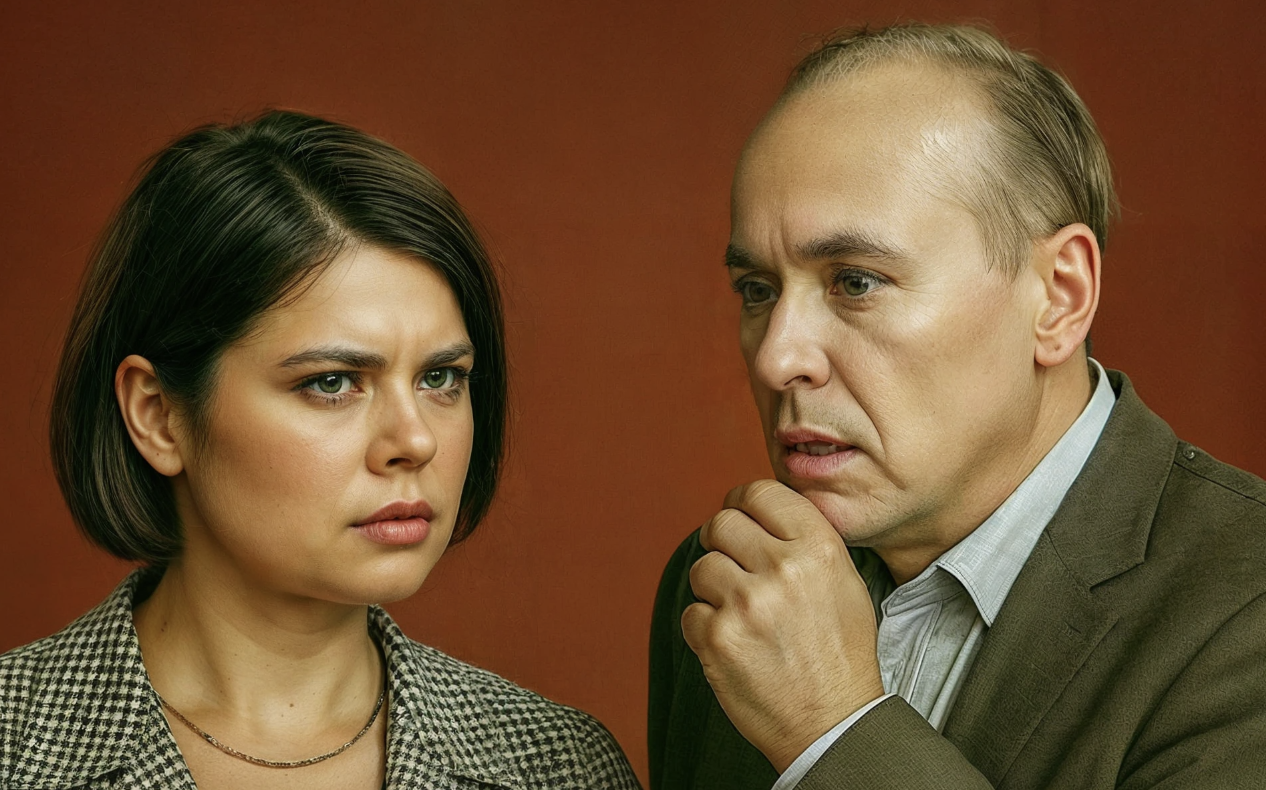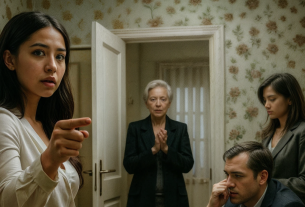“The apartment gets divided too,” my husband was running a ballpoint pen along the list he’d written on a sheet of graph paper. “That’s the law. Joint property.”
I sat across from him in the lawyer’s office and watched the blue line slide along the rows: “Apartment on Sadovaya — split in half. Car — split in half. Dacha in the Moscow region — split in half.”
The meeting with the lawyer
Twelve years of marriage fit into ten bullet points.
He had clearly prepared: the sheet was neatly folded in four, the handwriting even, like in a school notebook.
The lawyer, Marina Viktorovna, silently looked at me over her glasses. I took a thin folder out of my bag.
“There is one document,” I said calmly. “A prenuptial agreement from 2012. The apartment stays with me in the event of a divorce.”
My husband lifted his head. The blue line froze halfway through a word.
The forgotten agreement
“What agreement?” He put the pen down and looked at me as if I’d just started speaking a foreign language. “That… that was just formal stuff! You yourself said it was just a piece of paper.”
Marina Viktorovna took the folder, unfolded the document. Stamps, signatures, date — September eleventh, two thousand and twelve.
I remembered that day. We went to the notary’s office right after registering our marriage, he stood next to me and drummed his fingers on the table.
“Why do we need this?” he’d asked back then. “We love each other. This is some kind of distrust.”
“Just sign it,” I had begged. “The apartment was left to me by my mother. I want to give her memory a bit more protection.”
He’d waved his hand then.
“Fine, I’ll sign it if it makes you feel better.”
He signed without even reading. The notary smirked — I could see on his face he’d seen hundreds like him. Young, in love, convinced that the agreement was an empty formality.
“This is a legally binding document,” said Marina Viktorovna, running her finger along the text. “Clause three: in the event of dissolution of marriage, the apartment at the address Sadovaya Street, building seventeen, apartment forty-two, remains the sole property of the wife, Anna Sergeyevna Klimova. Signature, stamp, registration.”
My husband said nothing. I could see the muscles twitch in his jaw. He always did that when he was angry but trying to hold it in.
“But I…” he faltered. “I’ve lived there for twelve years. I renovated it, I paid the utilities…”
“I paid utilities too. I have the receipts as well. For all twelve years.”
That was true.
When my mother left me the apartment, she’d said: “Take care of it. It’s your support. Men come and go, the home stays.”
Back then, twenty-three years ago, when I was twenty-eight, those words had sounded cynical. Now, at fifty-one, they sounded like a prophecy.
Going through it point by point
“Fine,” my husband exhaled and went back to his list. “Then the car. We definitely bought that together.”
Silently, I took the next document out of the folder.
Purchase and sale agreement, 2015. Buyer — Klimova, Anna Sergeyevna. Payment made by bank transfer from my account. My phone vibrated in my bag — I turned it off.
“I was working remotely, remember?” I asked. “My salary was going to my card. You were between jobs then. You said, ‘Put it in your name, we’ll re-register it later.’ We never did.”
He went pale.
I wasn’t gloating — I was simply stating facts.
Strange feeling: for twelve years I’d been careful to make sure he never felt disadvantaged. I never said “my apartment”, “my car”. I always said “our home”, “our car”.
Words are not documents. He understood that now.
“The dacha,” he no longer drew lines with the pen, just read from his sheet. “The dacha in the Moscow region. We went there together, I dug the beds there…”
“The dacha is also a gift from my parents,” I said. “Deed of gift in my name, seven years ago. My father said then: ‘Let this be your own place.’ There are documents for that too.”
Marina Viktorovna stacked the papers and looked at my husband almost sympathetically.
“According to the prenuptial agreement and the documents of title, in the division of property you are entitled only to what is registered in your name or acquired with your funds. What can you present?”
He sat staring at his list. The blue lines now looked like a child’s drawing — careful, but meaningless.
“I have…” he fell silent. “I have personal belongings. Tools. A laptop.”
“Then the division will concern only that and the car,” the lawyer nodded.
“Wait,” he raised his eyes to me. “But I have a right… The law is on my side. Everything acquired during the marriage…”
“Not everything,” said Marina Viktorovna calmly, like a newsreader. “Property acquired before the marriage, received as a gift or inheritance, and property covered by a prenuptial agreement, is not subject to division. Article thirty-six of the Family Code.”
I looked at my husband and didn’t recognize him. Where had his usual confidence gone, that lightness with which he always “handled things”?
He was used to me agreeing. For twelve years I agreed to everything: his friends over on weekends, his decisions about our summer vacations, his choice of movies in the evenings. He thought it would always be that way.
“Anechka,” he called me that for the first time in two months. Ever since he’d said he was leaving. “Let’s do this without lawyers. We’re reasonable people. You keep the apartment, I take the car, and we part ways like adults.”
He ran a hand over his face. I noticed he’d lost weight over these two months. His face had thinned, there were shadows under his eyes.
I wondered if the woman he’d gone to notices details like that.
Last attempts
“All right,” he folded his list in four, mirroring the way he had unfolded it. “Keep the car. But the dacha… I’ve put so much work into it. I built that whole fence myself.”
“The fence stands on my land,” I replied. “By law, improvements to someone else’s property don’t grant ownership rights.”
Marina Viktorovna nodded:
“That’s correct. You could claim compensation for the cost of the improvements if you could prove they significantly increased the value of the property. Are you ready to provide receipts, an estimate, an appraisal?”
He fell silent. Of course he wasn’t. He’d put up the fence with a friend, bought materials for cash at a construction market. No paperwork.
“But I’ve lived with you for twelve years!” his voice trembled. “I worked, I earned…”
“You did work,” I agreed. “You earned. And you spent it on yourself. Remember how three years ago you bought fishing gear for a hundred and twenty thousand? Or how last year you went to Karelia with your friends on a fishing trip — at my expense?”
“That was from the family budget,” he tried to object.
“The family budget is my salary. Yours went on your needs. I wasn’t against it, I never was. But let’s not talk about ‘contribution’ now.”
He clenched his fists on his knees. I knew that gesture — despair mixed with helplessness.
“You planned all this,” he said quietly. “In advance. You prepared for it.”
“I did,” I confirmed. “For three months.”
The truth about the preparation
“Since the day you started hiding your phone,” I answered. “Before that it would lie around anywhere. Then you began taking it with you even to the bathroom.”
He flinched. Marina Viktorovna tactfully turned toward the window, pretending to study something in her papers.
“Then there was the new shirt,” I went on. “Light blue, small plaid. I never bought you shirts like that, you didn’t like them. And then you stopped eating dinner. You said you were watching your health. At fifty-two you suddenly started watching your health.”
“I didn’t…” he began, but I raised my hand.
“Don’t. I’m not reproaching you. I’m just answering your question: how I got all the documents. When a woman notices that people have stopped seeing her, she suddenly has time to take care of other things.”
He sat motionless.
I looked at him and thought: when exactly did I stop being angry?
Probably the day the lawyer first laid out all the papers in front of me and said, “You’re protected.” The anger left, and a calm certainty remained.
“So all this time you…” he didn’t finish.
“All this time I was collecting documents,” I nodded. “I requested copies of utility bills from the management company. Bank statements for the last twelve years. Property titles. Deeds of gift. Contracts.”
“Why did you need so many?” he asked quietly. “You can see I won’t get anything anyway.”
“So that there wouldn’t be any surprises. I didn’t want to sit here and listen to you talk about your rights while I frantically tried to remember where each piece of paper was. I wanted to know beforehand what was mine and what wasn’t.”
Marina Viktorovna turned back to us.
“Anna Sergeyevna acted absolutely correctly. Most divorcing couples waste time and money on court proceedings precisely because they haven’t prepared. Here everything is perfectly clear.”
My husband sat staring at his hands. Strong hands, tanned. This summer he’d gone south — without me. Said it was a guys’ trip with friends. I didn’t object.
Now I understood that friends had nothing to do with it.
“You knew,” he said quietly. “And you still didn’t ask me anything. Why?”
“Would you have told the truth?” I looked him in the eyes.
He looked away.
“There you go,” I said. “That’s why I didn’t ask. I prepared instead.”
The last try to win me back
“Listen,” he leaned forward, placing his hands on the table between us. “Let’s start over. I messed up, I’m an idiot. But twelve years — that’s not nothing. We were happy.”
“We were,” I agreed. “Then we stopped. It happens.”
“It doesn’t just ‘happen’!” he raised his voice for the first time during the entire meeting. “People work on their relationships, go to therapists, talk…”
“Talk,” I repeated. “Interesting word. When was the last time you asked how I was doing…? Three months ago? Or four?”
He had no answer.
“I’m not offended,” I said. “Honestly. I’m just stating a fact: you left our relationship before you left the apartment. I noticed that and drew my conclusions.”
My hands had trembled a little when I signed the first documents with the lawyer three months ago. It was scary to admit that it was really over.
Marina Viktorovna placed the agreement in front of me.
“You need to sign this. Or you go to court. There is no third option.”
I took the pen. The same blue ballpoint as my husband’s. He watched me sign under each clause. My handwriting had always been small and neat.
“Teacher’s handwriting,” my mother used to say.
“And if I don’t sign?” my husband asked.
“Then we’ll meet in court,” the lawyer replied. “The decision will be the same, you’ll just spend more time and money getting there. Your choice.”
The signature
He picked up the pen. Stared at the paper for a long time. I could see how tense his shoulders were.
He is fifty-two, almost fifty-three. He thought it would all go differently. That he’d leave, slam the door, and I’d cry and beg him to come back.
He miscalculated.
“You’ve really changed,” he said, without looking up.
“No,” I answered. “I just stopped agreeing to everything.”
He signed. Slowly, as if every letter cost him an effort. Marina Viktorovna took the documents, stamped them, scanned everything to her tablet.
“That’s it,” she said. “You’ll receive the court order in a month. You can collect your things at a time convenient for both sides.”
My husband stood up. Folded his list with the blue lines into quarters and shoved it into his jacket pocket. Took out his phone, looked at the screen — clearly there was a message. Put it back without replying.
He looked at me, opened his mouth as if he wanted to say something. Changed his mind.
Turned around and left. The door slammed louder than he’d meant it to.
Cool, but sunny
I stayed sitting in the office. Marina Viktorovna poured water from the cooler into two plastic cups and handed one to me.
“You did very well,” she said. “I rarely see clients this well prepared.”
“I’m a math teacher,” I replied. “I’m used to calculating everything.”
She smiled.
“I can tell. Is this hard for you right now?”
I thought about it. Hard? Strangely, no.
It felt like taking off a backpack after a long hike.
“I’m okay,” I said. “Just tired. Three months of tension is a long time.”
“Now you can relax,” the lawyer nodded. “The case is closed.”
I walked outside. October, cool but sunny. The leaves rustled under my feet, dry and cheerful. I took out my phone and texted my friend Larisa: “It’s done. He signed.”
She replied almost immediately: “Breathe. I’m on my way to you.”
I smiled. Larisa always knew what to say. Or when to say nothing at all.
I walked home thinking: what now? The apartment is empty, quiet. I can rearrange the furniture. I can get a cat — he never liked animals. I can finally open that Spanish app I downloaded two years ago and never once launched.
At home, I sat by the window with a cup of tea. I looked at that same list my husband had forgotten on the lawyer’s table. Marina Viktorovna had handed it to me: “For the memory. Or throw it away.”
I unfolded the sheet. Blue lines, neat handwriting. “Apartment — split in half. Car — split in half. Dacha — split in half.”
Everything was so simple in his head. Split everything down the middle and walk away.
But life doesn’t split fifty-fifty. It splits into “before” and “after”. Before the day I saw his phone in the bathroom. And after — when I realized I could live differently.
I folded the list and put it in the desk drawer. Next to the prenuptial agreement that had lain there forgotten for twelve years.
Mom had been right: the home stays. Men come and go.
My phone vibrated: “I’ll be there in half an hour. I’ll bring your favorite.”
Today, it was worth celebrating.
Not a victory — just the right to my own life.
Outside, the trees rustled. The October wind bent the branches, tore off the last leaves. Soon it would be winter, then spring. And then summer. A new summer, a different life.
I opened the window. Cool air burst into the room, bringing with it the smell of rain and freedom.
Everything was as it should be. Even though what’s right is rarely easy.
If you recognized yourself in this story, or simply started thinking about the documents gathering dust in your desk drawer — tap the heart.
Follow me if you want more stories about women who turned their brains on in time.
I promise: it’ll be interesting, honest, and with no sugar-coating



